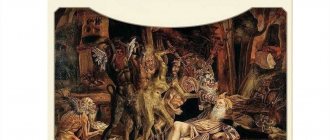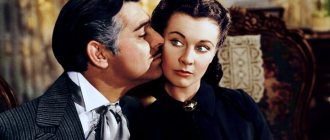- Essays
- On literature
- Ostrovsky
- The main characters of the play The Dowry
A.N. Ostrovsky in his work “Dowry” masterfully depicted a whole gallery of human images. In his play, the characters occupy different social positions, differ in character and morals, but the author managed to bring them together in order to identify the current problems of society: immorality, corruption, material well-being above human relationships.
Larisa Ogudalova
Larisa Dmitrievna Ogudalova is the central character of the play. She is homeless. She has an attractive appearance, she sings beautifully, has a good education, but the poverty of her family does not allow her to reveal herself fully. Larisa grew up in a decent family, she has a keen sense of what is happening. The girl's charm and beauty did not leave men indifferent, but for them she was just an expensive toy. Larisa does not have a dowry, so in the society of that time it is not possible for her to find a rich husband. An example for the heroine was her two sisters, who married unsuccessfully: one to a Caucasian man and the family knows nothing about her fate, the other to a foreigner who turned out to be a fraudster.
The girl lives with her mother Kharita Ignatieva, who in every possible way dreams of finding a richer place for her daughter. The girl understands that her mother will use any trick to achieve her goal. Larisa does not like her home; she dreams of leaving it as soon as possible. This pushes her to decide to marry Karandyshev. She does not love her future husband, but only he is ready to marry her without a dowry. The heroine herself is in love with the businessman Paratov, who shows signs of attention to Ogudalova, considering her fun. The jealousy of her future husband destroys the girl, but she considers her death a blessing. It’s hard for her to live in a society where the most important thing for people is money.
Paratov
Paratov Sergei Sergeevich is a nobleman a little over 30 years old. He is used to taking whatever he wants from life. So Larisa is a beautiful thing for him, which he uses and then throws her away. In the city, the hero is respected for his money. Having surrounded himself with luxury, Paratov does not notice how he is going broke. Now he is already selling his ship and one can assume that he will soon squander his entire fortune.
Karandyshev
Yuliy Kapitonich Karandyshev is Larisa’s fiancé, not a rich official. They had been communicating for about three years; the girl never considered him as a husband, but the young man himself dreamed of it. Having received consent to the marriage, Yuliy Kapitonich is proud, believing that he has risen in the eyes of the people around him. Karandyshev is jealous, envious, Larisa is his trophy, which he boasts to others. Fear of losing his treasure, Karandyshev, in a fit of jealousy, kills his beloved.
Mrs. Kharita Ogdulova
Larisa’s mother, Kharita Ignatieva Ogudalova, is a middle-aged woman, she lost her husband and lives with her daughter. Her house is like a bazaar because it is filled with different people. The woman is smart and understands that without a dowry it is not easy to marry off her daughter, so she brings as many men into the house as possible. Kharita Ignatievna is of noble origin, poverty does not allow her to have luxurious outfits, but she dresses brightly and fashionably beyond her years. Realizing that her two daughters did not marry well, she does not want to make a mistake with Larisa.
Knurov
Knurov - An elderly, rich and respected man in the city. Mokiy Parmenovich likes to be in the company of Larisa Ogudalova, but he sees her only in the role of his mistress. A married man, Knurov is not going to change his way of life. The hero follows fashion, reads newspapers in French, loves to walk down the street, and prefers to communicate with people of high society. The main thing for Mokiy Parmenovich is his own material well-being.
Vozhevatov
Larisa's childhood friend Vasily Danilych Vozhevatov is a young, rich merchant. He is always dressed in fashion and is not going to fall in love with anyone, he only loves himself. Frequently visiting the Ogudalovs, Vozhevatov only kills his free time. He is cunning and unprincipled, taking advantage of the girl’s naivety, he tries to corrupt her. For Vasily there is no feeling of compassion; for him Larisa is only an object of dispute.
Robinson
Robinson is Paratov's friend. His real name is Arkady. He is an actor by profession. Throughout the entire work he behaves impudently, a drinker constantly runs into scandals. His whole life is a drunken theater. Arkady does not have a passport, he is a funny person, he serves as a buffoon for Paratov, despite the fact that he calls him his friend. Robinson has nothing in life, he is a bad actor, but at the same time proud. He gets offended when he is not taken on the ship. With his hands Paratov does his dark deeds.
History of creation
As often happens, people’s recognition of “Dowry” came only a few years after the death of the author himself. The first performances staged in the St. Petersburg and Moscow theaters, unfortunately, were very disastrous, critics gave bad ratings and wrote conflicting reviews. However, the play quickly and easily passed censorship and was immediately published in the journal Otechestvennye zapiski in 1879.
It is believed that Ostrovsky wrote the drama based on real events that he had to observe during his life as a magistrate in Kineshma district.
The idea of this work was conceived by the author in the fall of 1874, but the work on it took a long time and painstakingly. During the time of its writing, the author released several more works, and finished “Dowry” only in January 1879. The play, which was not accepted and recognized at the time, has now become a classic and has gained true respect and immortality.
The essence of the work
First, it’s worth deciding who the dowry is? This is how in the old days they called girls who were poor and had no dowry, which was supposed to go into the capital of her future family. A woman in those days did not work, therefore, the man took her as his dependent, and, apart from the money received from his parents, he had nothing to hope for, his wife could not help him in any way in financial matters, and her children were automatically left without an inheritance with one of the parties. As a rule, such girls diligently tried to win the attention of suitors with their beauty, pedigree and inner virtues.
Alexander Nikolaevich Ostrovsky in his play describes the real internal state of an ordinary homeless woman who stubbornly seeks real, sincere love on earth, but realizes that it does not exist. No one ever dared to look into her soul and show sincere interest in her, so the girl becomes an ordinary thing for a rich man, she simply has no other choice or even a chance to receive decent treatment. Another option to arrange your life is to marry the pathetic, selfish and unassuming Karandyshev, a petty clerk who again marries Larisa for the sake of self-affirmation. But she rejects this option too. The author demonstrates all the contradictions in life that surround us, using the example of the destinies of the heroes. The essence of the play "Dowry" is to show the reader how mercilessly and vilely people exchange true love and friendship for an ordinary deal, from which they can only draw their own benefit.
Essay 2
Larisa Ogudalova
A young girl of a delicate spiritual nature, who grew up in a decent family and was well brought up. She has an attractive appearance, is well educated, sings and dances beautifully. Larisa attracts the attention of many men, but being homeless, she is deprived of the opportunity to get married well.
The beauty lives with her mother, whose dream is to marry her daughter to a rich man as soon as possible. The girl dreams of leaving her father's house, because she understands that her mother will try to achieve her goal by any means necessary.
Larisa is meek, naive and romantic, she sincerely believes in love and dreams of marrying Paratov. But in her hopeless situation, she sees only one possibility - to marry not for love to a petty official with a rotten soul, who agrees to take her as a wife without a dowry. As a result, the girl is destroyed by the jealousy of her future husband, but death is a blessing for her. A subtle, sensual soul is unable to live in a society where money decides everything.
Kharita Ignatievna
Larisa's mother is a woman of noble origin, whose financial situation has long been in decline. He sees his goal as marrying his youngest daughter to a rich man, which is almost impossible, because the girl is without a dowry. Despite her poverty, Kharita Ignatievna tries to show off people’s eyes, trying to show her wealth. All that matters to her is money. To achieve her goals, a woman is ready to do anything.
Paratov
A very rich middle-aged nobleman, accustomed to taking everything from life. He has never been deprived of the attention of women, he loves to attract attention to himself. For him, Larisa, who is in love, is just a beautiful toy, taking advantage of whose naivety, he played with it and then abandoned it. Paratov leads a luxurious lifestyle and doesn’t even notice how he squanders his entire fortune. After which all he can do is marry for convenience.
Karandyshev
A mercantile and envious petty official who decided to marry Larisa only in order to get a place in society. Narcissistic, he considers the girl unequal to himself, but at the same time presents her to everyone as his trophy. Jealous and pathetic. In a fit of jealousy, he kills Larisa, considering himself humiliated and insulted.
Vasily Vozhevatov
This hero is Larisa’s childhood friend. The young man has achieved a lot in life, now he is a rich merchant. But this is an immoral and hypocritical person. The young girl does not evoke his compassion; he sees in her only entertainment and an object of dispute.
Mokiy Knurov
A rich and respected man of advanced age in the city. He likes Larisa, but he is not ready to change his already established family structure and invites the girl to become his kept woman. Just like most of the characters in the work, only material wealth is important to him.
Robinson
Paratov's friend, former actor and drinker
Main characters
Larisa Ogudalova
- a young beautiful girl with no dowry. She feels extremely humiliated in this world because of her difficult position in society. Such girls, unfortunately, were of little interest to anyone during the writer’s life. The heroine loves to dream, so she falls in love with a rich nobleman and hopes for happiness next to him. With Karandyshev, the girl feels like a thing, her personality becomes insignificant, she directly tells him that she cannot love him the way she loves another. She is gifted with musical and choreographic talents. Her disposition is meek and calm, but deep down she is a passionate person who desires mutual love. The hidden strength of will is revealed in her character when she runs away from her engagement to face the risk of being disgraced and misunderstood by her environment. But for the sake of sincere feeling, she is ready to sacrifice her life, shouting a farewell ultimatum to her mother: either she will become Paratov’s wife, or she should be looked for in the Volga. As you can see, the desperate woman is not without passion; she puts both her honor and herself on the line. We analyzed the image of Larisa Ogudalova in the essay.
Kharita Ignatievna
- Mrs. Ogudalova, mother of Larisa Ogudalova, a poor noblewoman, a widow who was particularly dexterous in economic affairs, but could not give her three daughters a dowry, since her fortune was not great. She herself barely makes ends meet, but manages to throw away lunches and evenings in order to find a match for her latest young lady of marriageable age.
Yuri Karandyshev
- a poor official, the fiancé of Larisa Ogudalova, was distinguished by excessive narcissism and obsession. A selfish weirdo who was often jealous and looked a bit stupid. Larisa was a toy for him that he could show off to others. He feels all the contempt of the Ogudalovs’ entourage, but, nevertheless, he does not give up the idea of proving to them that he is an equal to everyone. His ostentatious arrogance, attempts to please and gain honor irritate society and the heroine herself; in comparison with the dignity and strength of Paratov, this little man is hopelessly defeated. He finally falls down in the eyes of his bride when he gets drunk at the engagement dinner. Then she understands that it is better to go to the Volga than to marry him.
Sergei Paratov
- a respected nobleman, a rich man who often threw money away for his own pleasure. He lived, caroused and courted women beautifully, so after gradual ruin he managed to capture the heart of a rich heiress. It is obvious that he is the same soulless egoist as Karandyshev, he simply lives in grand style and knows how to make an impression. The soul of the party and joker, above all he loves to have fun and throw dust into the eyes, which is why he chooses a marriage of convenience rather than sincere feelings.
Vasily Vozhevatov
- a friend of Larisa Ogudalova, a very rich, but immoral and vile person. The hero has never been in love and does not know what it is. He was distinguished by his wit and cunning. Vasily is not going to marry the girl, although he claims to take her into custody. He loses it in the lot, but consoles himself with the fact that he saved, which makes him an immoral and empty person. He is a merchant, a descendant of serfs, who achieved everything on his own. For him, the most important thing is not to lose the position he has achieved, so he refuses to help the young woman, not wanting to break the merchant’s word given to Knurov.
Mokiy Knurov
- a rich man of advanced age. He shows sympathy for Larisa, although he is married. A very specific and thorough person, instead of everything and immediately promises the girl whom he wants to make his kept woman, material benefits, making the reservation: “For me, the impossible is not enough.”
Arkady Schastlivtsev
(Robinson) - an acquaintance of Paratov, a failed actor who often liked to drink, but could not control his condition.
Gavrilo
- bartender, runs a coffee shop on the boulevard.
Ivan
- servant in a coffee shop.
Quotes from the play “Dowry” (Alexander Ostrovsky)
Larisa Dmitrievna Ogudalova:
“Well, well, tricks! You can’t live in the world without tricks.”
“There is no worse shame than this, when you have to feel ashamed for others.”
“We are poor people, we have to humiliate ourselves all our lives. It’s better to humiliate yourself from a young age, so that later you can live like a human being.”
“But you won’t get anything easily, you’ll remain nothing all your life.”
“If love were equal on both sides, there would be no tears.”
“I was looking for love and didn’t find it. They looked at me and look at me as if I was funny. No one ever tried to look into my soul, I didn’t see sympathy from anyone, I didn’t hear a warm, heartfelt word. But it’s cold to live like this. It’s not my fault, I was looking for love and didn’t find it... it doesn’t exist in the world... there’s nothing to look for.”
“If you are a thing, then there is only one consolation - to be expensive, very expensive.”
“Leaving life is not at all as easy as I thought... But there are people for whom it is easy. Apparently, it’s impossible to live like that at all; nothing seduces them, nothing is sweet to them, nothing is pitying them... But nothing is sweet to me, and I can’t live, and I have no reason to live! Why am I hesitating?.. I just don’t have the resolve. Pathetic weakness: to live, at least somehow, but to live... when you can’t live and don’t need to... It’s so good to die... there’s nothing to reproach yourself with yet.”
“Let those who have fun have fun... I don’t want to disturb anyone! Live, live everything! You need to live, but I need... to die... I don’t complain about anyone, I don’t take offense at anyone... you are all good people... I love you all... everyone.”
“Happiness will not follow you if you run from it.”
“Ah, it’s done; You can only regret it, but you can’t correct it.”
“You have to think about what you are talking about. Chat with others if you like, but be careful when talking to me!”
“No, I didn’t expect it now. I’ve been waiting for you for a long time, but I stopped waiting a long time ago.”
“I still just want to love you; I am attracted by a modest family life; it seems to me like some kind of paradise. You see, I stand at a crossroads; support me, I need encouragement, sympathy; treat me gently, with affection! Seize these moments, don’t miss them!”
Mokiy Parmenych Knurov
“...youth is a great thing.”
“Vozhevatov: She’s not stupid, but she has no cunning, not like her mother. This one is all cunning and flattery, but this one suddenly, out of the blue, says that it’s not necessary. Knurov: That is, the truth?
“... Russian man: it’s not enough to be drunk, you have to break down so that everyone can see.”
“It is a great pleasure to see you, and an even greater pleasure to listen to you.”
"Marry! Not everyone can do it, and not everyone will want to; Here I am, for example, married.”
“Like a Russian man: it’s not enough to be drunk; you have to break down so that everyone can see; If he breaks down, they beat him twice, well, he’s happy and goes to bed.”
“But know that even the meekest person can be driven to rage. Not all criminals are villains, and a humble person will decide to commit a crime when he has no other choice.”
“Yes, you can do things with money, you can. It’s good for him, Vasily Danilych, who has a lot of money.”
Sergei Sergeevich Paratov
“But jealous people are jealous for no reason.”
“Nothing is impossible in the world, philosophers say.”
“- Sorry for the indiscreet question! “If you’re very immodest, don’t ask.”
“I have a rule: don’t forgive anyone anything; Otherwise they will forget the fear, they will begin to forget.”
“Let me ask: your future spouse, of course, has many advantages? - No, only one. - A little. - But expensive. - Namely? - He loves me. - Really expensive; This is very good for household use.”
“So, let a woman cry, suffer, if only she loves you? - What to do, Larisa Dmitrievna! There is no equality in love, this is not something I started. In love you have to cry sometimes. - And certainly a woman? “Certainly not a man.”
“If love were equal on both sides, there would be no tears. Does this ever happen? - It happens occasionally. Only this is some kind of pastry cake, some kind of meringue.”
“— After all, it’s like anyone; There is no sample for taste or color. - True true. Some people like the city, others like the countryside. “Auntie, everyone has their own taste: one loves watermelon, and the other loves pork cartilage.”
“He’s a foreigner, he’s Dutch, his soul is short; They have arithmetic instead of soul.”
Vasily Danilych Vozhevatov
“Every product has a price...”
“ Don’t you see that this woman is created for luxury? An expensive diamond is expensive and requires a setting. - And a good jeweler. - You told the absolute truth. A jeweler is not a simple artisan: he must be an artist. In a beggarly situation, and even with a fool of a husband, she will either die or become vulgar.”
“So, friends: two bodies - one soul.”
“ This one is all cunning and flattery, but this one, out of the blue, says that it’s not necessary. - So the truth? - Yes, it’s true...”
“Before there were a lot of suitors, and there were enough for dowries; and now there are very few suitors: as many dowries, there are so many suitors, there are no extra ones - those without dowries are not enough.”
Yuliy Kapitonich Karandyshev
“People are judged by their actions.”
“...even the meekest person can be driven to rage. Not all criminals are villains..."
“What does “so” mean? That is, without thinking? You don’t understand that your words are offensive, right? - Of course, I didn’t mean to. - So this is even worse. You have to think about what you're talking about."
“Yes, it’s funny... I’m a funny person... I know myself that I’m a funny person. Do people really get executed for being funny? I'm funny - well, laugh at me, laugh out loud! Come dine with me, drink my wine and swear, laugh at me - I'm worth it. But to break the chest of a funny man, tear out his heart, throw him under his feet and trample him! Oh oh! How can I live! How can I live!
Robinson
“Drunk! Do I ever complain about this? If he were drunk, this would be such a delight - it would be better and you couldn’t wish for anything. I came here with this good intention, and with this good intention I live in the world. This is the goal of my life."
“What people! I'm surprised. They will keep up everywhere; Wherever you can get it, everything has already been taken, there are no more places left.”
“How, immediately on “you”? You and I didn’t drink brotherhood.”
Main theme
The drama of the human soul in an immoral society is the main essence of the main tragic theme in Ostrovsky’s play “Dowry,” which the author widely reveals through the heroine Larisa Ogudalova. She did not receive dowry from her mother, so she will have to suffer in this inhumane world. Suitors who are fighting for a girl do not take her seriously; she becomes either an object for them to brag about, or just a toy and thing.
The theme of disappointment in the world is also present in the work. The main character faces a terrible end: devastation, despair, dishonor and death. The girl believed in a better and new life, believed in love and kindness, but everything that surrounded her could prove to her that there was simply no love or a hint of enlightenment. All storylines in the work touch on social themes. Larisa lives in a world where everything can be found for money, even love.
Issues
Of course, in a tragedy one cannot do without ambiguous and complex issues. The issues in the play by Alexander Nikolaevich Ostrovsky are quite extensive and multifaceted.
The main issues in the work are problems of morality: Larisa commits a dishonest act in the eyes of society, but the backstory completely justifies her. The real immoral act is to deceive Karandyshev and get married without love. It is not better to become a kept woman among merchants. That's why Larisa has to thank her jealous fiancé for her death.
The author raises the problems of duty and honor, the purchase of the human soul. Morality in society is ostentatious, for it it is enough to simply maintain the appearance of decency, but the dishonest bargaining of its elected members remains without condemnation and without attention.
We also see in the work the problem of finding the meaning of life. The girl despaired and lost the meaning in everything, Vozhevatov and Knurov use her like a bright toy that they are not afraid to even bet. Paratov reports that he will soon marry another girl for material wealth, he betrays her and exchanges love for comfort. Larisa cannot understand and tolerate the complete absence of soul and indifference of those who surround her all her life. All the men who were next to her disappointed the heroine; she did not feel the respect and attitude that she deserved. For her, the meaning of life was love, and when it was gone, as was respect, Larisa chose death.
Dowry girl
- Why are you guys standing there? Let's pull ourselves up. Gena, pour it. - Stop doing that. - What did you do? — Dear Sergei Sergeevich, we have gathered with our small but very friendly team to finally congratulate you. - What are you doing? “You don’t pay us any money anyway.” Does anyone know how they met? I don't know. Tell me how you met. - Finish it. Finish it, Robinson. - Come on, tell me, Seryoga. - Tell. - Ira, do you know? - Don't know. — We met thanks to our class teacher. - Oh how! - That is, my mother. - Yes. She gathers our whole class every birthday. And so... Two years ago? - Three. “Three years ago I dared to approach Larisa and realized that this was the woman I had been looking for all my life. - Guys, let's get some air. It's stuffy here, let's go to the balcony. - Take the bottles and everyone to the balcony. Larisa, I'll call you in a second. Ira, have you reached your lawyer? — His phone is inaccessible. - Find it for me, dig it out of the ground. How should I issue invoices, he is the first. Find it. - Yes, Seryozha brought it from Italy. - When is the wedding? - We are still... - Paratov? — It all depends on Serezha’s schedule. — Sergey Sergeevich, can I congratulate you? — Karina, are you talking about the contract? Let's go talk. - Seryozha, who is this? - This? Another Robinson girlfriend. - And Ira? - What happened, Karina? - Why does he do this? - Karina. - Take your hand away. - What are you doing? - Irochka, can I have some cold water? - Yes. Certainly. - What's happened? - I don’t understand, we paid all the bills. What is the problem? Have you reached your lawyer? - Yes, what? Oh, call. - Sorry, I'll be in my office. Hello. - See you later. - Goodbye. - Goodbye. - When are you expecting? — Hopefully, in two weeks. Hello. Yes mom. Wait, I can't hear you. What? The connection here is poor. - Three seconds, I'll call you back. - Do you think I am fool? How much longer must I endure this? - Quiet, quiet. Karina, calm down. - It hurts, you know? “It’s been a month since you promised to tell her everything.” — We’ll come with Seryozha on the weekend. Yes. - Calm down. Then we'll talk. - Seryozha. - Crap. - Yes, hello. - Tell Seryozha. - You mean fell? At a construction site? - Larisa. Where is she? - Seryoga. — Seryoga, a man lost his temper at a construction site. - Where is she? - Seryoga, we have to go. Talk to him, Seryoga. Seryoga, we have to go. Do you hear? - How did you fall? - This is a serious matter. Go. - Did you call an ambulance? Not to death? - Hello. Dad, please take the car to Paratov's office. Now. Cold? “It’s unclear how he fell from the scaffolding.” It’s good that it wasn’t to death, Sergeich. So get ready for construction to stop. Violation of safety regulations is a serious matter. - Are you kidding me? There can be no talk of any stopping. — It’s possible, but it all depends on the price of the issue. You understand? - It's your problem. Make sure they graze theirs
What is the meaning of the play?
Ostrovsky wrote a very emotional drama that will not disappoint even an experienced and fastidious reader with its ideological and thematic content. The main idea of Ostrovsky's drama "Dowry" is to condemn the too high importance of wealth and money in society. Material wealth plays the most important role in life; a person who does not have them can only be a toy in the hands of a rich man, not entitled to sincere feelings. Poor people become the subject of sale to heartless barbarians who languish over their fortune. Everything around Larisa Ogudalova is saturated with crude cynicism and cunning, which destroy her pure, bright soul. These qualities determined the price of a woman’s life, reselling it among themselves as a faceless and soulless thing. And this price is low.
Using the example of the heroine, the writer shows how the heart of a homeless woman suffers, who is only to blame for the fact that she does not have a fortune behind her. Fate is so dishonest and unfair towards poor, but very bright and intelligent people. The girl loses faith in humanity, in her ideals, experiencing numerous betrayals and humiliations. What is the cause of the tragedy of the homeless woman? She could not come to terms with the collapse of her dream, with the destruction of her beliefs, and decided to get reality to arrange itself the way it needed to, as it should have happened in natural conditions. The heroine knows from the very beginning that she is taking a mortal risk, as evidenced by her farewell remark to her mother. She set conditions for the whole world: either her dream comes true, or she leaves this life without humiliating herself to marriage and cohabitation of convenience. Even if Karandyshev had not killed her, she would have followed her own warning and drowned herself in the Volga. Thus, the young woman became a victim of her illusions, her pride and her intransigence with the vulgarity of the environment.
Before us is a classic clash of romantic dreams and harsh, vulgar reality. In this battle, the latter always wins, but the author does not lose hope that at least some people will come to their senses and stop creating and maintaining unfair conditions of social relations. He places emphasis on true virtue and genuine values, which one must learn to distinguish from the vain squabbles of empty and petty scoundrels. The heroine's rebellion inspires courage to fight for her beliefs to the end.
Aphorisms and quotes from books by Russian authors -Baratynsky E. * Batyushkov K. * Berggolts O. * Berdyaev N. * Blok A. * Bulgakov M. * Bunin I. * Bykov V. * Vyazemsky P. * Herzen A. * Gogol N. * Goncharov I. * Gorky M * Griboyedov A. * Green A. * Dobrolyubov N. * Dostoevsky F. * Yesenin S. * Ilf I. * Karamzin N. * Kataev V. * Kolchak A. * Krylov I. * Lermontov M. * Leskov N. - new author, quotes * Likhachev D. * Lomonosov M. * Mayakovsky V. * Nabokov V. * Nekrasov N. * Ostrovsky A. * Petrov E. * Prishvin M. * Pushkin A. - new quotes * Radishchev A. * Roerich N * Saltykov-Shchedrin M. * Simonov K. * Stanislavsky K. * Stanyukovich K. * Stolypin P. * Sumarokov A. * Tolstoy A.K. * Tolstoy A.N. * Tolstoy L.N. * Turgenev I. * Tyutchev F. * Fonvizin D. * Chekhov A. * Schwartz E. * Eisenstein S. * Ehrenburg I.
Russia, end of XX - beginning of XXI
— Akunin B. * Altov S. * Vysotsky V. * Geraskina L. * Dementiev A. * Zadornov M. * Kunin V. * Melikhan K. * Okudzhava B. * Rozhdestvensky R. * Sakharov A. * Snegov S. * Solzhenitsyn A. * Suvorov V. * Talkov I. * Troepolsky G. * Uspensky E. * Filatov L. * Chernykh V. * Shenderovich V. * Shcherbakova G.
Ostrovsky Alexander Nikolaevich (1823 - 1886)
Quotes
- sheet
() () () 4 Biography >>
Quotes from the play by A.N. Ostrovsky "Dowry", 1878
How do you want him to talk if he has millions! Who should he talk to? There are two or three people in the city, with them he talks, but with no one else; well, he is silent. He doesn’t live here for long because of this; and I wouldn’t live if it weren’t for work. And he goes to Moscow, St. Petersburg and abroad to talk, where he has more space. — (Gavrilo, club bartender, about Knurov)
Before there were many suitors, and there were enough for dowries; and now there are very few suitors: as many dowries, there are so many suitors, there are no extra ones - the dowry-free women don’t have enough. — (Voshevatov Vasily Danilych; one of the representatives of a wealthy trading company)
“It would be nice to take a trip to Paris with such a young lady to an exhibition.” - (Knurov Mokiy Parmenych; one of the big businessmen of recent times, an elderly man with a huge fortune)
- Yes, it won’t be boring, the walk will be pleasant.
What are your plans, Mokiy Parmenych! - (Vasily Danilych Vozhevatov; one of the representatives of a wealthy trading company)
- And didn’t you have these plans too?
(...) Your chances are better than mine: youth is a great thing. And you won’t regret the money; You buy a ship cheaply, so you can make some profit. But tea wouldn’t cost less than “Swallow”? - (Knurov)
- Every product has a price.
Even though I’m young, I won’t be too presumptuous, I won’t give away too much. - (Vozhevatov)
- Don’t vouch for it!
How long does it take to fall in love at your age? and then what calculations! - (Knurov)
- No, somehow I don’t notice this in myself at all (...) that they call it love.
- (Vozhevatov)
- Commendable, you will be a good merchant.
- (Knurov)
- I keep wondering, did Larisa Dmitrievna really have no suitors besides Karandyshev? - (Knurov Mokiy Parmenych; one of the big businessmen of recent times, an elderly man with a huge fortune)
- There were, but she’s simple-minded.
- (Vasily Danilych Vozhevatov; one of the representatives of a wealthy trading company)
- How simple-minded?
That is, stupid? - (Knurov)
- She’s not stupid, but she’s not cunning, not like her mother.
This one is all cunning and flattery, but this one suddenly, out of the blue, says that it’s not necessary. - (Vozhevatov)
- That is, the truth?
- (Knurov)
- Yes, the truth;
But homeless women can’t do that. To whom she is disposed, she does not hide it at all. - (Vozhevatov)
- Don’t you see that this woman is created for luxury? An expensive diamond is expensive and requires a setting. — (Knurov about Larisa Dmitrievna)
- And a good jeweler.
- (Vozhevatov)
- You told the absolute truth.
A jeweler is not a simple artisan: he must be an artist. - (Knurov)
I want to know how soon a woman forgets her passionately loved one: the next day after separation from him, a week or a month later... (...) I will always think of you with respect; but women in general, after your action, lose a lot in my eyes. (...) These “meek, tender glances”, this sweet love whisper - when each word alternates with a deep sigh - these vows... And all this is repeated a month later to another, like a lesson learned. Oh women! (...) Your name is insignificance! — (Paratov Sergei Sergeich; brilliant gentleman, one of the shipowners, over 30 years old)
- There is no equality in love, this is not something I started. In love you have to cry sometimes. — (Paratov Sergei Sergeich; brilliant gentleman, one of the shipowners, over 30 years old)
- And certainly a woman?
- (Larisa Dmitrievna; daughter of Ogudalova)
- Of course, not to a man.
- (Paratov)
- Why?
- (Larissa)
- Very simple;
because if a man cries, they will call him a woman; and this nickname for a man is worse than anything that the human mind can invent. - (Paratov)
- If love were equal on both sides, there would be no tears.
Does this ever happen? - (Larissa)
- It happens occasionally.
Only this is some kind of confectionery cake, some kind of meringue. - (Paratov)
I am a funny person... I know myself that I am a funny person. Do people really get executed for being funny? I'm funny - well, laugh at me, laugh out loud! Come dine with me, drink my wine and swear, laugh at me - I'm worth it. But to break the chest of a funny man, tear out his heart, throw him under his feet and trample him! (...) And these are not robbers, these are honorable people... (...) But know that even the meekest person can be driven to rage. Not all criminals are villains, and a humble person will decide to commit a crime when he has no other choice. — (Karandyshev Yuliy Kapitonich; a young man, a poor official, Larisa’s fiancé)
The time of enlightened patrons, the time of philanthropists has passed; now the triumph of the bourgeoisie, now art is worth its weight in gold, in the full sense a golden age is coming. But, no matter what, sometimes they’ll give you blackening to drink, and they’ll give you a ride in a barrel from the mountain, for your own pleasure - which Medicis 1 you’ll attack. — (Paratov Sergei Sergeich; brilliant gentleman, one of the shipowners, over 30 years old)
Giving up on life is not at all as easy as I thought. (...) But there are people for whom this is easy. Apparently, it’s impossible to live like that at all; nothing seduces them, nothing is sweet to them, nothing is pitying them. (...) But nothing is nice to me, and I can’t live, and I have no reason to live! Why am I hesitant? (...) I just don’t have the determination. Pathetic weakness: to live, at least somehow, but to live... when you can’t live and don’t need to. (...) It’s so good to die... there’s nothing to reproach yourself with yet. — (Larisa Dmitrievna; daughter of Ogudalova)
- Knurov and Vozhevatov are drawing lots to see who will get you, they are playing toss - and this is not an insult? Your friends are good! What respect for you! They do not look at you as a woman, as a person - a person controls his own destiny; they look at you like you are a thing. Well, if you are a thing, that's a different matter. The thing, of course, belongs to the one who won it; the thing cannot be offended. — (Karandyshev Yuliy Kapitonich; a young man, a poor official, Larisa’s fiancé)
- A thing... yes, a thing!
They are right, I am a thing, not a person. (...) Finally the word has been found for me, you have found it. (...) Every thing must have an owner, I will go to the owner. - (Larisa Dmitrievna; daughter of Ogudalova)
- I’ll take you, I’m your master.
- (Karandyshev)
- Oh, no!
Every thing has its own price... (...) I am too, too expensive for you. (...) If you are a thing, then there is only one consolation - to be expensive, very expensive. - (Larissa)
I was looking for love and didn’t find it. They looked at me and look at me as if I was funny. No one ever tried to look into my soul, I didn’t see sympathy from anyone, I didn’t hear a warm, heartfelt word. But it’s cold to live like this. It’s not my fault, I was looking for love and didn’t find it... it doesn’t exist in the world... there’s nothing to look for. I haven't found love, so I'll look for gold. — (Larisa Dmitrievna; daughter of Ogudalova)
__________
1 — Medicis
- Medici Lorenzo the Magnificent (1449 - 1492); renowned patron of the arts and sciences; the name became a household name.
Genre
Drama, as a genre, presents to the reader the fate of the hero in a contradictory and cruel world, an acute conflict between the soul of a person and the society in which he lives. The purpose of psychological drama is to show the dramatic position of an individual in a hostile environment. As a rule, drama characters face a tragic fate, spiritual suffering, and internal contradictions. In a work of this type you can find many living emotions and experiences that are inherent in many of us.
Thus, Ostrovsky’s play vividly describes the internal state of Larisa Ogudalova, who rebels against the inhumane order in society, sacrifices herself in order not to sacrifice her principles. The heroine has difficulty accepting the circumstances that overtake her; she endures with horror all the trials that fate has prepared for her. This is Larisa’s personal tragedy, which she cannot survive. The psychological drama ends with her death, which is typical for works in this genre.








